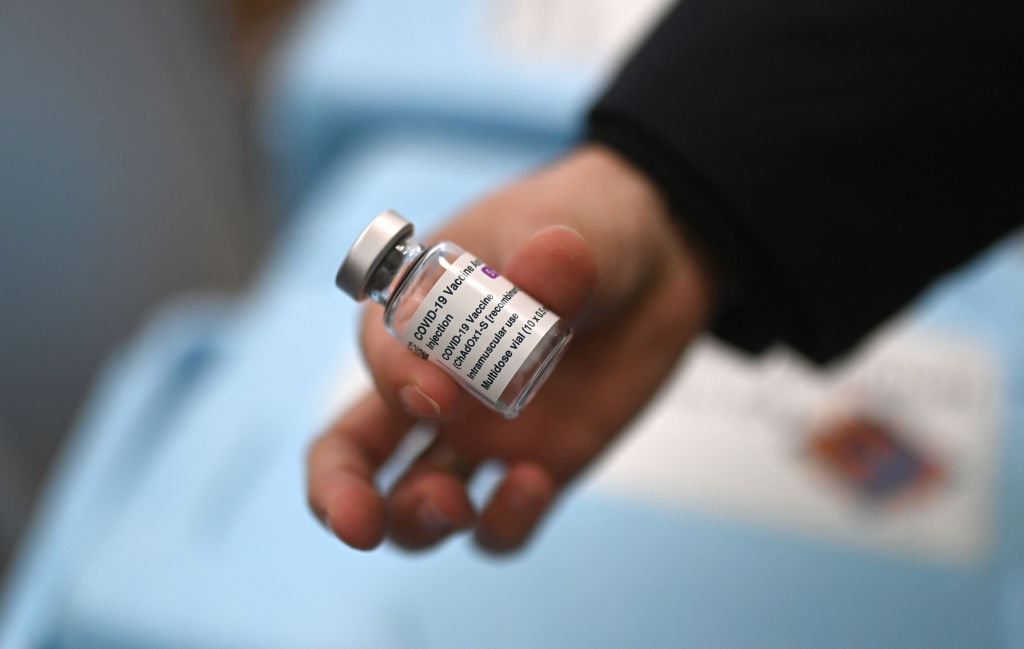It was the great British scientific triumph: an example of how big pharma can work altruistically for the good of the world, by making a vaccine available at cost price. But is the writing now on the wall for the AstraZeneca vaccine? This afternoon the European Medicines Agency (EMA) ruled that blood clots can be a ‘very rare side effect’ of the Oxford-AstraZeneca vaccine. It has encouraged health professionals to communicate that ‘people receiving the vaccine to remain aware of the possibility of very rare cases of blood clots combined with low levels of blood platelets occurring within two weeks of vaccination.’ There may be an age factor as well: ‘So far’ it reports, ‘most of the cases reported have occurred in women under 60 years of age within two weeks of vaccination.’ Previously, the EMA brushed aside fears about a link with blood clots, which had led to the vaccine being suspected in Germany and other countries, saying that the benefits outweighed the risks. Earlier this week a senior figure at the EMA admitted that there was a ‘clear link’ between the vaccine and blood clots.
Meanwhile, after weeks in which the government has insisted that the AstraZeneca vaccine is safe, things are beginning to move against it in Britain, too. The Medicine and Healthcare Products Regulatory Agency has today said that the under-30s should be given an alternative to the AZ vaccine. The shift came after seven deaths in Britain of people given the AstraZeneca vaccine changed the debate. Yesterday, Oxford University announced that it is to pause trials of the AstraZeneca vaccine in children while awaiting a judgement on its safety from the MHRA. While the risks from the vaccine are certainly small – they didn’t show up in phase 3 trials and the US trials involving up to 50,000 volunteers – the balance of risks is very different when administering the vaccine to children and young people, who are highly unlikely to come to any harm from Covid-19 either. This morning, a member of the Joint Committee on Vaccination and Immunisation (JCVI), Dr Maggie Wearmouth, called for the rollout of the AstraZeneca vaccine to be slowed in adults, too, in order not to damage confidence in the vaccine.
This is not the only challenge to this vaccine. Last month a study by the South African Medical Research Council Vaccines and Infectious Diseases Analytics Research Unit and published in the New England Journal of Medicine suggested that the AstraZeneca vaccine has an efficacy of only 21.9 per cent when preventing symptomatic disease caused by the South African variant – way below the 76 per cent measured in US trials of the AstraZeneca vaccine. It could be that the vaccine still reduces risk of serious illness and death from the South African variant, but that was not measured in the trial, which involved mostly younger people and recorded no deaths, even in the placebo group.
Meanwhile, a small study released by Pfizer last week claimed that its vaccine is 100 per cent efficacious against the South African variant. The study only involved 800 people and contradicted earlier laboratory studies claiming that the Pfizer vaccine is less good at stimulating the production of antibodies against the South African variant than against other variants. Nevertheless, the apparent disparity in vaccines efficacy against the South African variant is going to have to be closely considered. The South African variant is not dominant in Britain, but it is present and could become very important as borders are opened up.
The government has invested a huge amount of money and faith in the AstraZeneca vaccine, and has rightly been praised for its rapidly rollout, which was based on the best evidence at the time. The AstraZeneca vaccine has been wrongfully attacked by President Macron among others, who declared it to be ‘quasi-ineffective’ in the over 65s – without any evidence. It will take political courage to admit that the AstraZeneca vaccine is second-best, and should perhaps be phased out as other vaccines become available in substantial quantities. But it is beginning to look as if that might be the most-likely outcome.







Comments